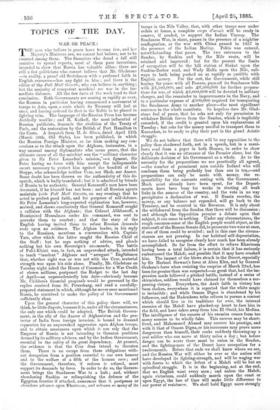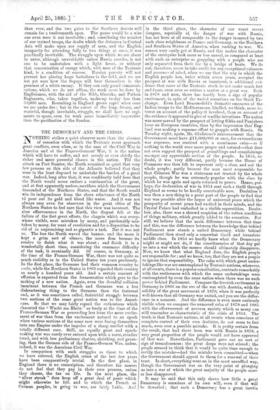TOPICS OF THE DAY.
WAR OR PEACE? THE men who believe in peace have become few, and her Majesty's Ministers are, we cannot but believe, not to be counted among them. The financiers who dread a fall still contrive to spread reports, most of them pure inventions, intended to show that Russia has valuable allies ; there are still a few politicians who cannot believe that Mr. Gladstone —in reality, a proud old Scotchman with a profound faith in English resources—has any fight in him ; and there is the editor of the Pall Mall Gazette, who can believe in anything; but the majority of competent mankind see war in the immediate distance. All the few facts of the week tend to that conclusion. Both Governments are arming as rapidly as ever, the Russian in particular having commenced a movement of troops to Asia, upon a scale which its Treasury will feel at once, and having ordered its fleet in the Baltic to be placed in fighting trim. The language of the Russian Press has become decidedly warlike ; and M. Katkoff, the most influential of Russian publicists, demands the abolition of the Treaty of Paris, and the restoration by the British of Port Hamilton in the Corea. A despatch from M. de Giers, dated April 12th (March 30th, Old Style), has been published, in which the Russian Foreign Minister, so far from making any concessions as to the attack upon the Afghans, insinuates, in a way unusual among diplomatists who mean peace, that the ultimate cause of all the mischief was the "military character given to Sir Peter Lumsden's mission,"—a figment, Sir Peter having no force with him except the indispensable escort necessary to protect him against the banditti of the Steppe, who acknowledge neither Czar, nor Shah, nor Ameer. Some doubt has been thrown on the authenticity of this despatch, which is badly translated ; but it is admitted by friends of Russia to be authentic. General Komaroff's men have been decorated, if he himself has not been: and all Russian agents maintain (vide Pall Mall Gazette, on any evening) that he acted in perfect good faith, and for purposes of self-defence. Sir Peter Lumsden's long-expected explanation has, however, arrived, and shows conclusively that General Komaroff sought a collision with the Afghans ; that Colonel Alikhanoff, a Russianised Mussulman under his command, was sent to provoke them to combat ; and that the story of the English having incited them to refuse Russian demands rests upon no evidence. The Afghan leader, in his reply to the Russians, mentions a conversation with Captain Yate, after which the latter sought the Russian Chief of the Staff ; but he says nothing of advice, and pleads nothing but his own Sovereign's commands. The battle of Pul-i-Khisti was, in fact, an unprovoked attack, intended to teach "insolent" Afghans and " arrogant " Englishmen that, whether right was or was not with the Czar, material strength was upon his side alone. Finally, Mr. Gladstone on Tuesday night asked the House of Commons for a War Credit of eleven millions, postponed the Budget to the last day of April—an unprecedentedly late date—obviously because Mr. Childers's financial proposals would be governed by the replies received from St. Petersburg, and read a carefullyprepared statement in which, although he never once mentioned Russia, he contrived to make the policy of his Government sufficiently clear.
Upon the general character of this policy there will, we think, be little dispute, because it is, under all the circumstances, the only one which could be adopted. The British Government, as the ally of the Ameer of Afghanistan and the protector of India from foreign invasion, is bound to demand reparation for an unprovoked aggression upon Afghan troops, and to obtain assurances upon which it can rely that the Emperor of Russia is not intending to threaten positions deemed by its military advisers, and by the Indian Government, essential to the safety of its great dependency. At present, the evidence is that the Czar does intend to threaten them. There is no escape from these obligations without derogation from a position essential to our own honour and to the welfare of a fifth of the human race ; and the Government, therefore, if redress is refused, must support its demands by force. In order to do so, the Government brings the Soudanese War to a halt ; and, without abandoning Suakim or relinquishing the defence of the Egyptian frontier if attacked, announces that it postpones or abandons advance upon Khartoum, and releases so many of its troops in the Nile Valley, that, with other troops now under orders at home, a complete corps d'armie will be ready in reserve, if needed, to support the Indian Viceroy. The Soudanese War, in short, pauses in the presence of a mightier conflagration, as the war with China paused in 1857 in the presence of the Indian Mutiny. Pekin was entered, notwithstanding that pause. The two entrances to the Soudan, by Suakim and by the Nile route, will be retained and improved ; but for the present the limits of occupation will be the hill station of Sinkat upon the Suakim-Berber road, and Wady Haifa upon the Nile, railways to both being pushed on as rapidly as possible with English money. For the rest, the Government, while still hoping for peace with all Powers, pays-off its Soudanese bills with £4,500,000, and asks £6,500,000 for further preparations for war, of which £4,000,000 will be devoted to military charges, and the remainder to improvements in the Navy, and to a particular expense of £500,000 required for transporting the Soudanese Army to another place—the most significant sentence in the whole manifesto. So hopeless does Mr. Gladstone feel of peace, that he asks not only for permission to withdraw British forces from the Soudan, which is implicitly conceded, if the credit is granted upon his explanations of Tuesday ; but asks for the money needful to transport them to Kurrachee, to be ready to play their part in the grand Asiatic struggle. We do not believe that there will be any opposition to the policy thus shadowed forth, not in a speech, but in a manifesto read from a paper in both Houses, in order to show clearly that it was no utterance of the Premier alone, but the deliberate decision of his Government as a whole. As to the necessity for the preparations we are practically all agreed, —the number of prominent men outside Ireland who will condemn them being probably less than one in ten,—and preparations can only be made with money, the responsibility for the amounts resting with the Government. Much must already have been spent, for the Departments have been busy for weeks in riveting all weak links in the armour of the country, and the vote in no way precipitates a declaration of war. If Russia recedes, the money, or any balance not expended, will go back to the Treasury, and be counted in the Revenue. It is only about the withdrawal from the Soudan that there will be discussion ; and although the Opposition promise a debate upon that subject, it can come to nothing. Under any circumstances, the rough common-sense of the English people would object, as the statecraft of the Roman Senate did, to prosecute two wars at once, if one of them could be avoided ; and in this case the circumstances are not pressing. In our habitual self-depreciation, we have failed to recognise clearly how much has been already accomplished. So far from the effort to relieve Khartoum having been a total failure, it is certain that it has seriously embarrassed the Mahdi, and possible that it may have crushed him. The impact of the blows struck in the Desert, especially by Sir Herbert Stewart's force at Abou Klea, and by General Graham's force when resisting the surprise of March 22nd, has been far greater than was suspected—so great that, had the impression made followed a pitched battle, instead of a series of skirmishes, soldiers would have claimed for themselves a surpassing victory. Everywhere, the Arab faith in victory has been shaken, everywhere it is reported that the white magic is invincible ; and while Osman Digna is abandoned by his followers, and the Hadendowa tribe refuses to pursue a contest which should live in its traditions for ever, the internal enemies of the Mahdi have plucked-up heart to face him in the field, and have taken away from him El Obeid, his Medina. The intelligence of the success of his enemies comes from too many sources to be wholly false. This success may be shortlived, and Mahommed Ahmed may recover his prestige, and with it that of Osman Digna, or his successors may prove more dangerous than himself, their ranks suddenly throwing-up a real soldier who can move at thirty miles a day ; but before danger can be acute there must be union in the Soudan, and the fighting-men of the Desert have occupation for a twelvemonth. Before that ends we shall know where we are, and the Russian War will either be over or the nation will have developed its fighting-strength, and will be waging war with forces to which the defeat of a Mahdi will be but an episodical struggle. It is in the beginning, not at the end, that we English want every man ; and unless the Mahdi, again victorious, could suddenly march upon the coast or upon Egypt, the loss of time will make little difference to our power of resistance. We shall hold Egypt more strongly than ever, and the two gates to the Southern deserts will remain for a twelvemonth open. The pause would be a wise one even were it not inevitable ; and, considering the number of our trained troops, the drafts which the distances in Central Asia will make upon our supply of men, and the English incapacity for attending fully to two things at once, it was practically inevitable. The struggle upon which we are about to enter, although unavoidable unless Russia recedes, is not one to be undertaken with a light heart, or without that concentration cf energy which, with men of the Teutonic kind, is a condition of success. Russian poverty will not prevent her placing huge battalions in the field, and we are not yet sure how the Sepoys will bear themselves in the presence of a white enemy. If they can only guard communications, which we do not affirm, the work must be done by Englishmen, with the aid of the Sikh, Ghoorka, and Pathan Regiments, who, taken together, make-up to-day less than 50,000 men. Recruiting in England grows rapid when once we are under fire ; but in the outset of the long, dreary, and wasteful, though inevitable, struggle, we shall have no regiments to spare, even for work more immediately imperative than the pacification of the Soudan.



































 Previous page
Previous page